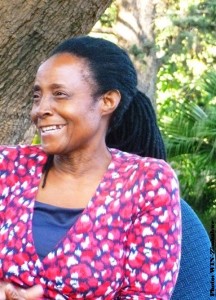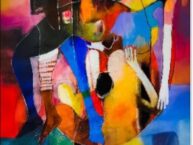 The year is 1974. Jesesi Mungoshi, then a single young woman, is lying ill in her room at her sister’s house. She is apparently in pain. In a short moment, her sister’s husband comes into the room in the company of a friend and a fellow artist named Charles. Introductions are made. Charles has already published his first book Coming of the Dry Season (1972) but this information escapes the intros and Charles keeps it that way.
The year is 1974. Jesesi Mungoshi, then a single young woman, is lying ill in her room at her sister’s house. She is apparently in pain. In a short moment, her sister’s husband comes into the room in the company of a friend and a fellow artist named Charles. Introductions are made. Charles has already published his first book Coming of the Dry Season (1972) but this information escapes the intros and Charles keeps it that way.
Jesesi is not sure if the men are drunk or not but the first words Charles says are, “Ah saka tinoziva vakareba sei kana vakarara? (Ah, so how do we know her height when she is lying down?)
Although she is in pain, she bursts out laughing. Why is she laughing? She cannot tell. Later, the two men leave the house. But Charles has done his job like a doctor of love with the romantic poetry of his few words.
The above is but one of the fondest moments Jesesi Mungoshi, a gifted actress and wife of the great author Charles Mungoshi, remembers about her early days of acquaintance with her husband.
Jesesi, who featured in the Zimbabwean film Neria as the main character Neria, narrated touching episodes in the life of her family and the great writer at a Zimbabwe Writers’ Association organized writers’ gathering themed ‘Writers’ Family Reminisce’ held on Saturday, April 5, in Harare.
In 1974 Charles was working for the then Book Centre (now Textbook Sales) while she had finished school but had not yet decided which career to follow in her life. When she then fell in love with Charles after the first encounter, he proposed to marry her that year but she refused.
Her refusal to get married disappointed the young lover Charles whose intention had been to work and raise money for the bride price.
He told her he was resigning from his job because there was no more reason to work. And he actually left his job and used this free time to finish his two books Ndiko Kupindana Kwemazuva and Waiting for the Rain which simultaneously came out in 1975.
Love is an invisible twine that draws two hearts to each other regardless of strict decisions made earlier. It is even more true that the heart knows what the mind may not.
With a brother strongly advising her to first proceed with her education, Jesesi found herself in a tight spot where she had to choose between getting married and lose his brother’s trust and perhaps his support or lose the man of her heart.
Jesesi said she decided to get married. Immediately after receiving the good news, Charles right away went back to work but for a different employer. He found a job at the Literature Bureau after being recommended by the late great actor Walter Muparutsa who by then worked at the Bureau. In a few months, Charles saved his money and married the love of his life in 1975. The following year the couple was blessed with their first born son and named him Farayi (Be happy).
Charles’ deep passion for writing exhibited itself even at unusual times, said Jesesi.
At some point soon after getting married, Jesesi said she boarded a bus with Charles to Mbare. It was supposed to be a romantic day out.
“As a woman I was excited to be sitting next to my man in the bus and I expected a conversation,” she said.
But the writer Charles always made sure he carried a notebook in his pocket. On this day in the bus he fished it out and started jotting notes about what he observed around him. His nature made Jesesi want to know him better and be part of his life.
Jesesi said Charles would later at home condense his notes and it would take him a few days to finish a complete manuscript. During the period when he is writing, he would enter and live in his own world.
“He would literally get possessed by writing that he would not see you walking into the room,” said Jesesi.
She remembered Charles once told her about an experience he had after completing his manuscript Makunun’unu Maodzamoyo which is set in Manyene, Chivhu.
Charles was living in Kambuzuma but what happened was that while writing the book, he lost sense of where he was. At 3am, after he finished what would become a masterpiece, he rose, stretched out arms, satisfied with the completion of a task. But something was wrong in his mind. He could not tell if he was in Harare or Chivhu.
As told to Jesesi by Charles, this was a moment the author drifted on the edges of insanity as his mind immediately plunged into a vexing cloud of reality and imagination. But he slept only to be awakened later by birdsongs and then he sobered.
Although Charles’ drinking habit could have scared her out of her marriage, Jesesi said she stood strong by him because she had accepted her husband wholeheartedly. For her, marriage is a matter of committing oneself to the promise of love and faithfulness even during hard times.
“At some point he worked at the UZ and I would some days get a phone call informing me Charles has been arrested for drunken driving and sleeping in the car parked in the middle of the road. I would go and collect him from the police station. I would know his writing troubles as I wanted to be part of him. I kept going strong because I knew God had a purpose for us,” said Jesesi.
She went on to rubbish claims made by the media some years ago that she had divorced or abandoned her husband.
In 2010, the Mungoshi family faced the biggest challenge. Charles had taken a long break from drinking but one evening he just could not sleep because of severe pain. Jesesi said her family thought of prayer before they thought of the hospital and thank God he got better and slept very well that night.
On another evening Jesesi was invited to an all-night prayer at the church by her sons Farayi and Charles Jnr. Before she went out, she checked on Charles in the bedroom. He was asleep holding in his hand a beer bottle that still had almost all its contents. She took the bottle, replaced the beer with water and put the bottle back on the bedside table.
The next morning when she came back home Jesesi said she simply slipped in and slept beside Charles, not wanting to disturb him.
At around 12 noon their daughter came in and she was the first to discover that neither Charles’ eyes were blinking nor his body moving. Jesesi was awoken by her daughter’s scream. Her two sons joined her and efforts to resuscitate Charles were fruitless. The family started to pray and prayed before they took him to hospital.
“I grew up being a fearful woman but when I received Christ I was strengthened to the extent that when Charles fell in a coma on that day, my children and I believed he was going to be fine,” said Jesesi.
During the time when Charles was hospitalized, some relatives lost hope and others suggested taking Charles to their rural home. Arguments erupted. On the other hand, the doctors were beginning to lose hope. The children stuck with their mother and assured relatives that their father is going to be alright.
Then one day, a nurse on duty walked into the ward where Charles was and there he was, Charles sitting in his bed. What seemed a hopeless situation suddenly transformed itself into a triumphant scenario.
Later the family took Charles to St. Giles Rehabilitation Centre in Harare and his condition improved. He had begun using a wheel-chair but at St Giles he gradually started to walk.
An organization from Kenya and the government of Zimbabwe assisted the family in paying for the costs incurred in hospital and at St. Giles, said Jesesi.
“At home, prayer kept us hoping and to date, I have seen tremendous improvement in Charles’ health,” she said, adding that she would have brought him to the meeting had she found proper private transport.
Jesesi also hinted on some of Charles’ publishers’ insensitivity, saying she remembered during these trying times one publisher demanded that Charles (who was not able to walk or talk) and nobody else should come to speak with the company. However, the hiccups with publishers have been solved now with the help of lawyers, she said.
In all the problems which she faced during her husband’s illness, Jesesi said she is very much indebted to her sons for the togetherness and maturity they exhibited. Today, the family has set up a publishing company called The Mungoshi Press which published Charles Mungoshi’s latest and NAMA Award-winning novel Branching Streams Flow in the Dark.
Writer Shumirai Nhanhanga, who also attended the writers’ gathering, thanked Jesesi for being a woman of strength.
“You are a woman of a kind who stood up by your husband. Many women would have given up in such hard times but you were there for your husband. You did not break the promise. You are his hope. Even the children and relatives will be proud of you as their hero. As a woman also I am proud of you. We thank you so much for standing by our fellow writer,” said Nhanhanga.
Writer and actor Lexta Mafumhe Mutasa, son of the late renowned author Nobert Mutasa, also spoke at length about how his father related to his family as a writer. The Dambudzo Marechera and Solomon Mutsvairo families, who were also expected to present under the same theme ‘Writers’ Family Reminisce’, were not able to attend due to forces they could not control.
The meeting was held at the Centre for Applied Social Sciences in Belgravia and was chaired by writer Memory Chirere and attended by a group of about sixteen writers. The meeting also provided an opportunity for ZWA members to get updates from their Chairperson Musaemura Zimunya.


